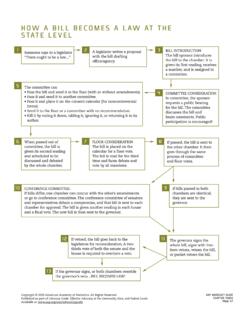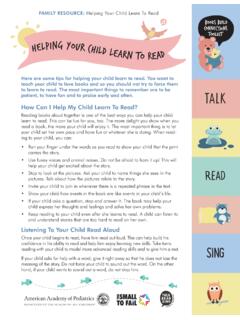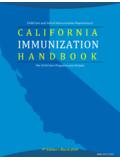Transcription of Cocooning through Tdap vaccination - AAP.org
1 Protect infants against pertussis Cocooning through tdap vaccination The CDC's Recommendations to Protect The Explanation for the Recommendations Newborns from Pertussis Infants less than 12 months old, especially infants less Expecting Mothers than 3 months old, are most likely to die from a pertussis --Pregnant women should receive a tdap vaccine with infection. Infants younger than 6 weeks old should not every pregnancy, ideally between 27 and 36 weeks receive the pertussis vaccine. Infants are vaccinated at 2, gestation, no matter how long it's been since her last Td 4, and 6 months of age, but are not well protected until or tdap vaccine. Antibodies are expected to pass to the the series is complete. A booster is recommended around baby and provide protection as soon as the mother gives 15 months and at the age of 4. birth. If a woman is vaccinated during pregnancy, she will likely --If mothers do not receive a tdap vaccine during not spread pertussis to her newborn child.
2 Giving tdap pregnancy, and they have never been vaccinated, they to the mother between 27 and 36 weeks gestation makes should get vaccinated immediately after the baby is it so antibodies pass to the baby. Studies have shown that born. This may not protect the baby directly, but it may maternal vaccination likely protects infants from being prevent the mother from becoming infected and passing infected or, at least, having severe pertussis. pertussis to her baby. --4 out of 5 infants who contracted pertussis in the All adults and adolescents at least 11 years old who have in recent years got it from someone who lived with them not previously received a tdap vaccination , should be (when a source was identified). vaccinated at least 2 weeks before coming into close --The body's immune response peaks 2 weeks after tdap contact with a newborn. This includes, for example, is administered.
3 If a mother is vaccinated after the fathers, siblings, grandparents, caregivers, and healthcare baby is born, there are still 2 weeks after birth when professionals. Creating a circle of protection around the the mother and infant are susceptible to infection. So, baby is called Cocooning . although it's better for an expecting a mother to get Everyone 11 years and older should receive one dose of vaccinated during pregnancy, getting it after the baby is tdap , regardless of contact with infants. born will still provide some protection. The Safety of tdap During Pregnancy &. Breastfeeding Regarding tdap vaccination during pregnancy, the CDC. Advisory Committee on Immunization Practices found that: --Tetanus vaccines have been safely given to pregnant women since the 1960s. --There are not more or unusual side effects in pregnant women. --There is no harm to the fetus.
4 Getting tdap during pregnancy provides early immunity. Providing this early immunity may mean that the infant's immune response to DTaP vaccine at 2 months of age Page 1 of 2. Protect infants against pertussis Cocooning through tdap vaccination is not as strong. But we don't know if that would mean For more information they were less protected against pertussis. The benefits of Recommendations: vaccinating during pregnancy and protecting a newborn preview/ outweigh the potential risk of a lessened response to DTaP. vaccine. Information for providers: vpd-vac/ tdap vaccine can safely be given to breastfeeding mothers. Created by representatives from the American Academy of Pediatrics, American Academy of Physician Assistants, What can you say to expecting parents? Immunization Action Coalition, and Maxim Health I strongly recommend tdap vaccine for all pregnant Systems.
5 Program supported in part by Sanofi Pasteur. women with each pregnancy, even if your pregnancies are only a year or two apart. It is the best way to protect your infant from pertussis and it is safe for you and the baby. I also recommend that adolescents and adults in close contact with the baby make sure they have received a dose of tdap , too. This will protect them and create a cocoon of protection around the baby. Babies can receive their first dose of pertussis vaccine at 2. months, but they are at risk for serious complications from pertussis before that age. Most infants are not completely protected until they have had 3 doses (at 2, 4, and 6. months of age). Many adults do not even know they have pertussis when they expose a baby. The illness is usually less severe in adolescents and adults. Protecting the baby by vaccinating everyone around the child is called Cocooning .
6 If you vaccinate adults in the office, offer to vaccinate pregnant women and close family contacts. If you do not offer vaccine in your office, consider partnering with those who do ( , primary care offices, local health department). Page 2 of 2.














